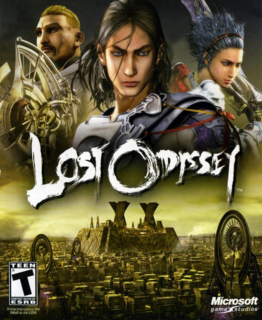A thousand year journey worth traveling.
Graphics are ordinarily beautiful, music is ordinarily soothing, and game play is ordinarily simple. But Lost Odyssey is by no means an ordinary game, exploring lives and humanity like no other. While invincibility is a theme mostly explored with many video game antagonists, Lost Odyssey only imposed such luxury on their anti-thesis. Luxury can be punishment too.
For the seemingly impossible feat of telling a thousand year story in a 40 hour game, Lost Odyssey adopted a retrospective approach that risked compromising the main story progression. Such emphasis was given in exploring the backgrounds of each unwilling immortal- done in the fashion of dream sequences- players' patience may be severely tested. Indeed, Lost Odyssey seems intent in letting us have a taste of what it is like to live a life where time is of the infinite, something not all players can necessarily agree on. To the most willing of gamers who are able to grasp the true meaning behind this story-heavy game, the experience could be the most peculiar- story advances and backtracks simultaneously, yet only obligatorily so.
Lost Odyssey introduces 2 forms of being, the mortals and the immortals. The latter, heavily weakened by their locked memories, need to rely on the mortals to learn new skills. The immortals are therefore given much room for customization, whereas the mortals have to make do with an innate set of skills. While it would soon become crystal clear that the mortals' usefulness is limited, the notion that any person who has lived a thousand year longer ought to be stronger than these fragile beings stays consistent. If most RPGs have to grapple with the balance in having the right amount of customization for their characters, then Lost Odyssey's dual system would have effectively bypassed such worries.
Hironobu Sakaguchi attempts the impossible- explaining how it feels like to be person who simply cannot die. He did this by first eliminating the memories of a person who has a thousand year's worth of it, which at first glance seems convenient, if not terribly clichéd. Not so. Understanding a mere fraction of the immortals' past may be sufficient for the game to coherently progress, but like how life can often turn out to be, it's the little memories- ones that we swear they exist- that could matter the most. Across Kaim's journey in understanding more about his relevance in a world where time so cruelly burdens him, he will encounter many side events, many of which will happen at the most unexpected of places. These shall trigger many of his defragmented memories in the form of dreams, ones that may seem less important, but really none the less so. Some are poetic, some may appear apathetic, but all are almost outrageously simple. This adds a touch of subtlety, lending weight to the underlying life lessons each dream sequences seeks to replicate.
In fact, subtlety is a theme that is thoroughly reverberated in the entire game. The refreshingly simple game play hinted sophistication with the ring system. Whenever an attack is executed, players have to hold on to the RT button, letting go only at the exact moment in which the two layers of a ring overlap. Depending on how accurate such an endeavor is, bonuses such as greater damage or status infliction can be added to each attack. Rings can be created and customized by collecting materials found over the course of the game. As grinding for levels is impossible in Lost Odyssey (characters stops leveling once a certain threshold is met), players will find it most advantageous to build an arsenal of rings to deal with the many challenging boss fights. But in having to use different rings in different situations, stability is sacrificed for strategy, often making battles a cumbersome affair.
The same subtlety characterized graphics, sound and music. Powered by the Unreal Engine, Lost Odyssey looks absolutely stunning, yet uncannily, hardly overplayed. The sharp and crisp in-game graphics showed little difference from the abundant cut scenes found in the game, though often let down by the many loading times. Music is especially impressive, an accolade that is to be expected of maestro Nobuo Uematsu. Lost Odyssey is also mostly voice-acted, and when we consider the diversity of the extremely likeable cast of characters, the actors did a really good job in making all of them believable, and perhaps more importantly, bearable. The scripts are as well extremely well translated, the emotion-evoking dream sequences an easy example.
Regrettably, Lost Odyssey is often let down by technical deficiencies. Each battle would have a 5 seconds initial drag time that further burden the already slow nature of its turn-based system. It is also at times victimized by frame rate issues, again a glaring fault considering that cut-scenes are most generous. The side quests are often so uninteresting they border to the point of being crude, adding nothing to the game but some desperate play time. It is unfortunate a game that revolves around the concept of time is encumbered by the very nature of which.
If life is a journey, then what is life on a thousand-year journey? Lost Odyssey could well be a sage skillfully disguised as a competent video game. In an era where the industry is so often being blamed for all things that belittle lives, it is so heartening to have a game that seeks not to blow us away, but to show us that quite on the contrary, one can actually learn a thing or two about life from it.

